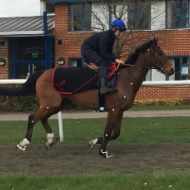
RVC reveals influence of shoeing and surface conditions on galloping horses.
A new study has highlighted the influence of horseshoe and surface conditions on the hoof movements of racehorses.
Led by the Royal Veterinary College (RVC), the study sheds light on how different shoeing practices impact horses' movements on different surfaces, and could inform how racehorses' safety can be best supported.
The research team, led by Dr Kate Horan, assessed the effect of eight horseshoe-surface combinations on hoof acceleration patterns.
Using accelerometers mounted to the dorsal hoof wall to measure hoof accelerations on 13 retired Thoroughbred racehorses, researchers trialled combinations of aluminium, barefoot, GluShu and steel shoeing conditions at a gallop on turf and artificial surfaces.
Using data from the accelerometers, researchers found that hoof accelerations experienced at impact were greater on turf than the artificial track, suggesting that the better damping capacity of the artificial surface leads to reduced hoof vibrations upon landing.
With regard to the different shoeing conditions, the impact acceleration peaks were 7-12 percent higher in aluminium shoes, 2-8 per cent higher in GluShus and 10-18 per cent higher in steel shoes when compared to barefoot condition.
In preventing excessive shock loading, and the associated musculoskeletal injuries in racehorses, the team has suggested that a combination of an artificial surface and barefoot hooves may be beneficial for minimising the exposure of the hoof and distal limb to large accelerations during hoof landing.
Dr Horan, lead researcher on the paper, explained: “This exciting study has demonstrated that patterns of hoof landing and push-off in galloping racehorses’ are affected by horseshoe and surface conditions.
“In contrast to other equestrian disciplines, the shoes permitted for racing Thoroughbreds are currently tightly controlled in the UK by the British Horseracing Authority.
“In this study, we sought to explore the effect of both current and novel shoeing options on hoof-ground interactions using retired racehorses galloping on turf and artificial training tracks.
“This work was a collaborative effort involving James Coburn’s farriery team and staff and horses from the British Racing School.”
In the studies' conclusion, the researchers stated a need for further study on the topic: “Further work is needed to relate these findings to injury risk and racing outcomes specifically, particularly in racehorses galloping at top speeds.”
Dr Horan concluded: “We hope that the findings from this research will equip the racing industry with new knowledge to inform their decision-making regarding horseshoes and surfaces and ultimately improve both the performance and safety of our racing equine athletes.”
Published in Animals, the study is available to read here.
Image (C) Royal Veterinary College



 The Federation of Independent Veterinary Practices (FIVP) has announced a third season of its podcast, Practice Matters.
The Federation of Independent Veterinary Practices (FIVP) has announced a third season of its podcast, Practice Matters.